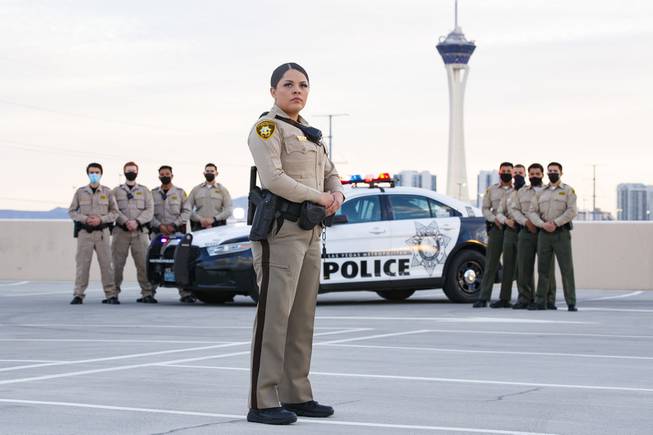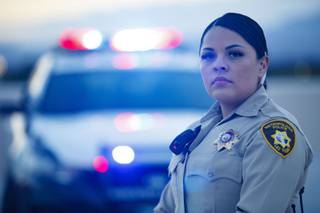
Metro Police Officer Alexis Hodler poses with members of the LVMPD Explorer Program at Metro headquarters Wednesday, March 17, 2021.
Saturday, March 20, 2021 | 2 a.m.
Jorge Cortes was shopping for back-to-school supplies at a store in northeast Las Vegas when the chaos started.
Cortes heard what sounded like firecrackers and saw people frantically running through the aisles looking for safety. He was only 14, and frightened.
Two anti-police extremists who had shot and killed two Metro Police officers at a nearby restaurant were hunkering down inside the store.
Cortes’ fears were subsided when an officer appeared informing shoppers that the incident was over and that it was safe to exit. The extremists — who had fled the store after having ambushed and murdered Officers Allyn Beck and Igor Soldo at a nearby pizza restaurant — were dead.
The feeling of relief Cortes experienced that afternoon has shaped his career path. He wants to be that police officer who helps residents in distress.
“That was actually the area where I live. It kind of hit home for me that day,” he said.
Cortes, now 20, graduated recently from the LVMPD Explorer Program, where he spent the past four years learning the ins and outs of the profession in preparation for hopefully joining the force.
The program is part of the national volunteer program, Law Enforcement Exploring. It prepares young adults ages 16-20 for the basics of the job, including how to take emergency phone calls, process a crime scene and go on patrol.
Explorers affiliated with Metro Police gather at department headquarters near downtown Las Vegas twice weekly, learning how to handcuff a suspect, conduct a traffic stop, respond to a domestic violence call, search for a weapon, rescue an injured police officer and more. They’re paired with a mentor officer, who takes them on ride-alongs to observe the duties police perform.
The program has about 75 participants this year, down from about 120 on a typical year, said Sgt. Michael Rodriguez, the program’s supervisor. Rodriguez said some explorers left the program last summer at the request of their parents, who were afraid of them becoming officers in the wake of the social unrest after the police killing of an unarmed Black man in Minnesota.
“We work hard to filter out some of that noise about law enforcement and policing and focus on the fact that this remains a very noble career,” he said.
That’s the case for Cortes, who credits the program with helping him develop the skills he’ll need to join the department. He plans to apply for the police academy.
“I feel like this program brought me out of my comfort zone and made me do things I never thought I could do,” he said.
Rodriguez, a product of the explorer program, said working with the young adults “is a chance to give back and kind of pay it forward.”
The program is based on a paramilitary structure, where explorers hold positions of rank similar to that of the department. Cortes, for instance, was a sergeant of a platoon with six other explorers, and tasked with tracing their attendance and community service participation.
Alexis Hodler’s journey to joining Metro also went through the program. She detailed growing up in a troubled household, where police were frequently called to the home.
On one call, she told the officers her ambitions were to one day be like them. She’s been on the force for two years — and all thanks to the explorers.
Not only did the program begin to teach her the skills to become an officer, it also taught her accountability and discipline, she said.
Explorers are required to perform 10 hours of monthly community service. They also have to maintain a 2.0 grade-point average. And when they slip up — say, forgetting their identification for a session — they are asked to write an essay on the importance of equipment.
“I initially wanted to get into the program just to become a police officer, but I was able to gain a lot more from the program,” said Hodler, who is an adviser with the program.
Those interested in the program are required to pass a police background check, have no felony convictions or lengthy criminal history.

